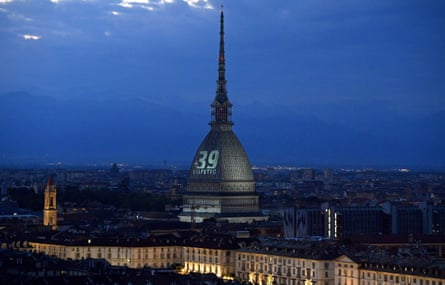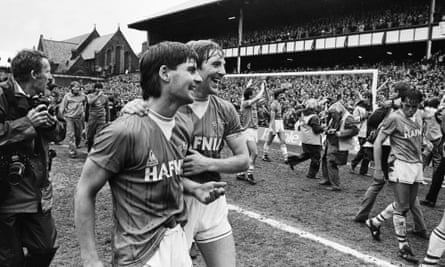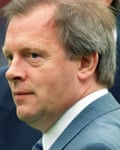In May 1985 the Sunday Times published a now-notorious editorial which alleged that British football was “in crisis: a slum sport played in slum stadiums and increasingly watched by slum people, who deter decent folk from turning up”. That deterrent was reaching peak effectiveness: in the following season top-flight attendances dropped to their lowest level since the first world war, and in the second tier to depths not seen since 1906-07.
If this was English football in the gutter, it had taken more than Heysel and a European football ban to drag it there. Indeed, that Sunday Times editorial was published 10 days before Liverpool and Juventus met in Brussels. Already that season had seen riots involving Luton and Millwall fans in March and the Bradford fire, which led to 56 deaths, on 11 May, among countless lesser known incidents caused by decaying infrastructure or fan violence.
Then came Heysel. The game was played in a rickety old stadium, whose disintegrating terraces provided ample ammunition for missile-throwing fans, whose chief police officer had not attended any planning meetings, where a pre-match alcohol ban went unenforced and a nominally neutral area next to Liverpool’s fans, separated by the flimsiest of fences, had been allowed to fill with Italians. Many factors contributed to the charge of English fans across the terraces that resulted in the collapse of a wall and to 39 people being crushed, trampled or suffocated to death and 600 more injured, but only the English fans, certainly but not uniquely far from innocent, shouldered any blame.
Somehow order was restored and the match played, Juventus winning 1-0, but it was instantly obvious that this final had to mark the end of more than just a football competition. The Guardian published an editorial headlined: “Quarantine our sad, sick game,” which demanded that English football be given time and space to find and implement solutions. “We are the root of the contagion. We are the home of the virus, and we must act accordingly,” we wrote, demanding a period out of international competition. “It will of course do the game great harm. International stars will move abroad. Standards will waver. Gates will plummet. But the only way of treating a virulent and mysterious virus is the most rigid quarantine.”
This was a far from unanimous opinion, certainly within the game. “Most of us thought Liverpool and maybe Juventus should be banned,” said Ron Atkinson, the Manchester United manager at the time. “No one else.” Yet when Fifa banned all English clubs from playing so much as a friendly on foreign soil (a largely pointless exercise, rescinded within a fortnight), Margaret Thatcher, the prime minister, welcomed “a proper opportunity to put our own house in order”. Liverpool had already withdrawn from the following season’s Uefa Cup, followed by the FA pulling out the rest of its representatives. Uefa announced its own ban soon afterwards, 35 years ago on Tuesday.

“Thatcher, whose knowledge of football was notoriously limited, called for English clubs, particularly Liverpool, to be banned,” wrote Kenny Dalglish. “I felt it the height of irresponsibility for Thatcher to come out so quickly with such rash statements when she didn’t know the facts. She probably got all the English clubs banned. If she’d kept her mouth shut, the rest of them might not have suffered.”
Everton, under Howard Kendall, had one of the great teams in their history, one that might, had they gone on to win the European Cup, now be revered elsewhere as they still are at Goodison Park. Two weeks before Heysel they won the Cup-Winners’ Cup in a peaceful final against Rapid Vienna in Rotterdam, prompting Brian Clough to wonder: “On that performance, how long is this team going to rule Europe?” They would never have the chance. “Everton suffered hugely as a club,” said their defender and captain, Kevin Ractliffe. “We had just won the title and the Cup-Winners’ Cup so we really fancied our chances of maintaining England’s dominance in Europe. Instead, the team broke up and all the talent started dwindling away.”
Liverpool themselves won three of the next five league titles. In 1987 they remodelled their team, bought John Barnes, Peter Beardsley and Ray Houghton, and under Dalglish played magnificent football for most of the following three years. This side, too, would wane before they got a chance to play in Europe. “We can only imagine what we might have achieved, how many more trophies we would have won,” wrote the goalkeeper Bruce Grobbelaar. “Are we still bitter? I can’t speak for the other players, but they must have felt it just as much as I did.”
Every year after 1985 English clubs and the FA talked optimistically about the ban being lifted, only for events to weaken their case. In 1986 about 150 fans of West Ham and Manchester United brawled on a cross-Channel ferry; in 1987 a game between West Germany and England in Düsseldorf led to one stabbing and 48 arrests. The behaviour of many England fans at the 1988 European Championship was bad enough to provoke fears of the ban being extended to include the national team, rather than eased.

The tide turned at the 1990 World Cup, a tournament that started with Lennart Johansson, the Uefa president, saying the chances of English clubs being readmitted for the following season stood at “only 10%”. It ended with England reaching the semi-finals in front of largely well-behaved fans, and to the door opening. Two teams – Manchester United in the Cup-Winners’ Cup and Aston Villa in the Uefa Cup – were allowed to play in 1990-91. Liverpool, the champions, were told they had to serve one additional year.
Though United ended that season with victory over Barcelona in the Cup-Winners’ Cup final, English clubs found their return to continental competition was anything but easy. On an international stage that English clubs had dominated, they were now enfeebled. The 1985 European Cup final was the eighth in nine years to feature an English side (they had won the other seven) and an English manager. It took until 1999 for another English team to get there, and no English manager has won a major European trophy since Kendall’s 1985 success with Everton. “That ban hit the managers as much as the players,” John Toshack said. “We lost the experience of home-and-away European ties. A League Cup game against York is not the same. It’s the travelling, and it’s the tactics.”
The effect of the ban on England’s ability to attract international talent was such that in the 1985-86 season only one non-British player moved to a First Division team from a foreign club: John Sivebæk, a 24-year-old Dane signed by Manchester United from Vejle for £200,000 despite his medical revealing a long-term pelvic complaint. The ban also hurt clubs’ finances, pushing them towards the creation of the Premier League in 1992, which allowed top-division sides to make more money, and to pay players more. A Uefa regulation that limited clubs to three foreigners – particularly testing for English teams, with players from the rest of the UK and from the Republic of Ireland counting towards that number – was scrapped in 1995 as a result of the Bosman ruling, allowing clubs to recruit freely not just from around Britain, but across Europe.

Gordon Taylor, then as now the chief executive of the Professional Footballers’ Association, warned that this would lead to “a flood of foreign players coming here, which I believe will be to the detriment of our game”. The flood came, but not the detriment. The following season top-flight clubs signed precisely 50 non-British players from foreign clubs, including Gianfranco Zola, Fabrizio Ravanelli and Patrick Vieira. When United became the first English European Cup winners since Heysel in 1999 it was with a team built around graduates from the club’s youth system but also including a Dane, a couple of Norwegians, a Dutchman, a Swede and a Tobagonian.
“Of course, the success is down to the English players and managers but it’s also down to the foreigners,” said Chelsea’s then manager, Gianluca Vialli. “We’ve done our best to improve the game in England. You need to get overseas players in. That was the signal for Italian clubs to be successful in Europe and, if you don’t do that while other clubs are doing it, then you fall behind them and the gap becomes too difficult to catch up.”
The lifting of the Heysel ban coincided with the Taylor report into the 1989 Hillsborough disaster, which forced clubs across the divisions to improve their facilities. From slum stadiums and slum people grew all-seat stadiums and penthouse prices. Many would argue that this process was not entirely positive, but it certainly returned a game in crisis to robust health: when this season was suspended average top-flight gates were above 39,000 for the first time. With the final 427 games either cancelled or destined to be played behind closed doors, the cumulative attendance at English league matches in 2019-20 stands at 25,092,248, over 8.5m more than in the entire 1985-86 campaign.
It is not just English football that has changed in that time but English society, and Heysel was just one of a number of significant events that pushed it down its path. But if the ban was in the end relatively brief, it could certainly be argued that its impact is still being felt.
